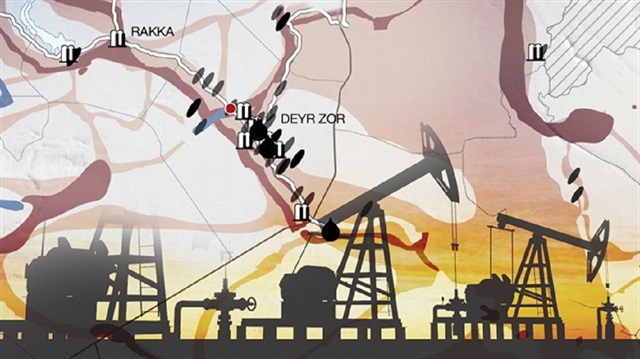
Raqqa, the most important urban center for Daesh after Mosul, has long been considered the terrorist organization's capital by the U.S.-led international coalition forces.
Overrun by Daesh in January 2014, the city of Raqqa is the terrorist organization's de facto capital and the center from which it conducts its organizational planning and coordination.
The city sits on the banks of the Euphrates and is an important agricultural center. However, its greatest strategic asset is the role it plays in Daesh's energy sector, being the terrorist organization's focal point in funneling oil and gas supplies, which are Daesh's largest source of income.
Located 140 kilometers to the southeast of Raqqa, Deir ez-Zor plays a critical role on the energy road, boasting Syria's largest oil fields from which crude oil is transferred to Raqqa's mobile refineries.
The regime of Bashar Assad has had a major setback in recent years after Daesh managed to seize Syria's major oil fields, depriving the government of a vital source of income and rendering it unable to meet the ever-growing demand for petroleum products, which exacerbates the energy crisis in the country, which is already suffering under the effects of an oil embargo.
Despite controlling all major oil fields in Syria, Daesh has blown up all major oil and gas pipes in the country.
The West has turned its back on the humanitarian tragedy unfolding in the region since 2003, according to the head of Economy of Energy Institute and Boğaziçi University Professor Gürkan Kumbaroğlu.
Kumbaroğlu said that the West, which stood first in line to claim the region's oil and gas supplies, is now once again discussing who is set to receive what share of the cake.
Citing a recently released UNICEF statement that warns that millions of people, including close to 500,000 Syrian children living under poor conditions, suffer from severe deprivation, Kumbaroğlu said that the West's main concern in Syria and northern Iraq is only to gain access to these countries' oil and gas resources.
“Despite the existing oil embargo, EU countries' only aim remains the oil and gas coming from Syria and Iraq," Kumbaroğlu claimed.
Pointing to Syria's estimated reserves of up to 2.5 billion barrels of oil and 240 billion cubic meters of natural gas, Kumbaroğlu claims those estimates fail to include the reserves found offshore or extracted from rock through fracking.
As for Iraq, OPEC's second-largest crude oil-producing country, boasting 143 billion barrels of oil and 3.5 trillion cubic meters of natural gas reserves, Kumbaroğlu emphasized that “in the places suffering tragic humanitarian catastrophes, there are oil and gas reserves that are on route to be moved to Western countries."
















